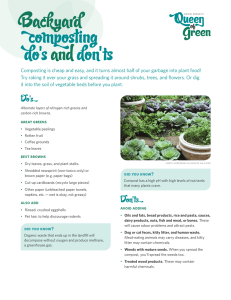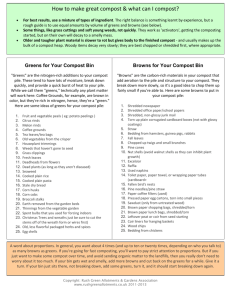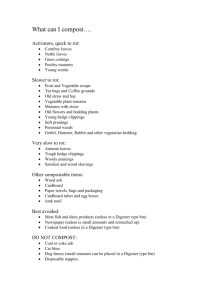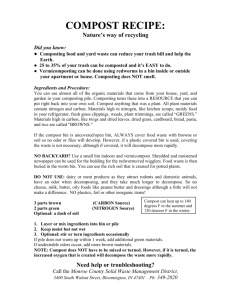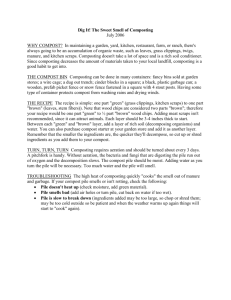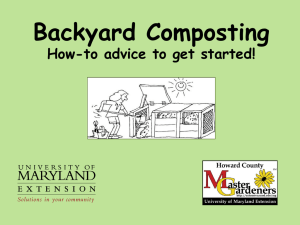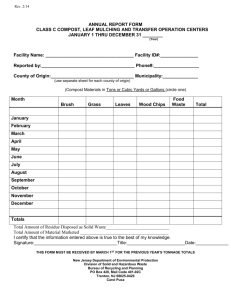Compost Activity Sheet
advertisement
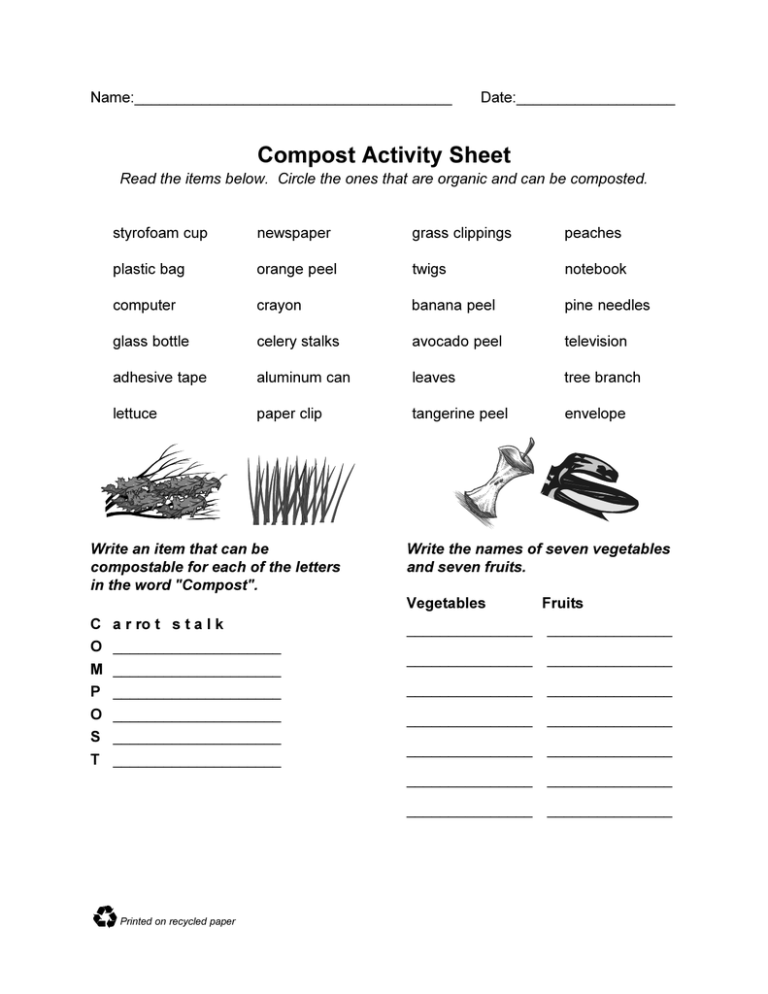
Name:______________________________________ Date:___________________ Compost Activity Sheet Read the items below. Circle the ones that are organic and can be composted. styrofoam cup newspaper grass clippings peaches plastic bag orange peel twigs notebook computer crayon banana peel pine needles glass bottle celery stalks avocado peel television adhesive tape aluminum can leaves tree branch lettuce paper clip tangerine peel envelope Write an item that can be compostable for each of the letters in the word "Compost". Write the names of seven vegetables and seven fruits. C O M P O S T _______________ _______________ a r ro t s t a l k ____________________ ____________________ ____________________ ____________________ ____________________ ____________________ Vegetables Fruits _______________ _______________ _______________ _______________ _______________ _______________ _______________ _______________ _______________ _______________ _______________ _______________ Printed on recycled paper Recycling In Nature Recycling occurs in nature every day. For example, leaves that have fallen to the ground decompose and turn into compost, a nutrient-rich soil which helps plants to grow healthily and strong. In addition, the organic material serves as food for bacteria and fungi which serves as food for earthworms which serves as food for beetles and ants, and so on. You can just imagine how this food chain continues. But when you rake leaves and grass clippings and throw then away, you not only create waste that has to be collected and processed, but you interfere with an important cycle in nature. The environmentally-friendly thing to do is to make a compost pile using yardwaste and other organic material. Its easy to maintain a compost pile in your backyard. Start with soil and then add equal amounts of greens and browns. Greens are sources of protein which attract organisms to the pile to breakdown the material. The greens also provide nitrogen to the pile. Examples of greens include grass clippings and food scraps. Browns are carbohydrates and they provide carbon to the compost pile. Examples of browns include dry leaves and twigs. COMPOST BIN GREENS BROWNS GREENS BROWNS Once you have established an initial layer of material, place a layer of greens, then a layer of browns, then a layer of greens and continue to alternate the layers on a regular basis. This will ensure that the compost pile has an equal amount of greens and browns. Its important to regularly mix the material in the pile if you want the decomposition process to take place rapidly. Then over a period of anywhere from three to twelve months the material will breakdown into compost and will be ready to be used as a natural fertilizer for plants and trees. Directions: In the puzzle below, find the words related to composting. bacteria fungi compost worms decompose organic nutrients yardwaste nitrogen carbon F U B N S N I T R O G E N S W I G M F U N G I A C A T A Y A R D W A S T E I L N B A C T E R I A P U N W E W O O R C B A N U T A I I G G M E O W O R M S G T R L M P O M N F A M S E D T E I O N P C A R B O N D U A N S I O R G A N I C E N I X T T S A W D R A C C T P O W Y E F S O P I Y S Compost Pile REFERENCE SHEET In order to maintain a backyard compost pile remember the following tips: n Add a layer of browns (dry leaves or twigs) then a layer of greens (fresh grass clippings, leaves and food scraps), then a layer of browns and continue to alternate the type of material you add to the pile. n Keep the pile moist, but not soggy because the material will not decompose as rapidly if it is too wet. n Do not add meat, bones or dairy products because these items will attract animals to the pile. n Trim tree branches to 1/4" in diameter or smaller because they will decompose faster. n Mix the material in the pile regularly (the more you mix the pile, the faster it will decompose) to allow aeration. COMPOST BIN GREENS BROWNS GREENS BROWNS Printed on recycled paper To learn more about how you can purchase your own backyard composting bin, please call 697-2700 or 930-2727 (toll-free). SWA
